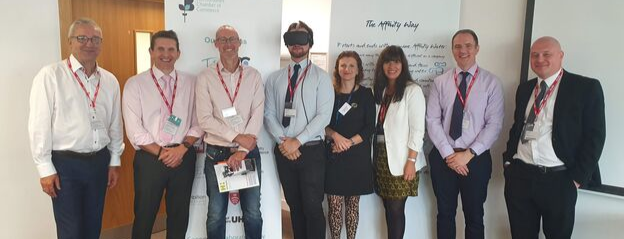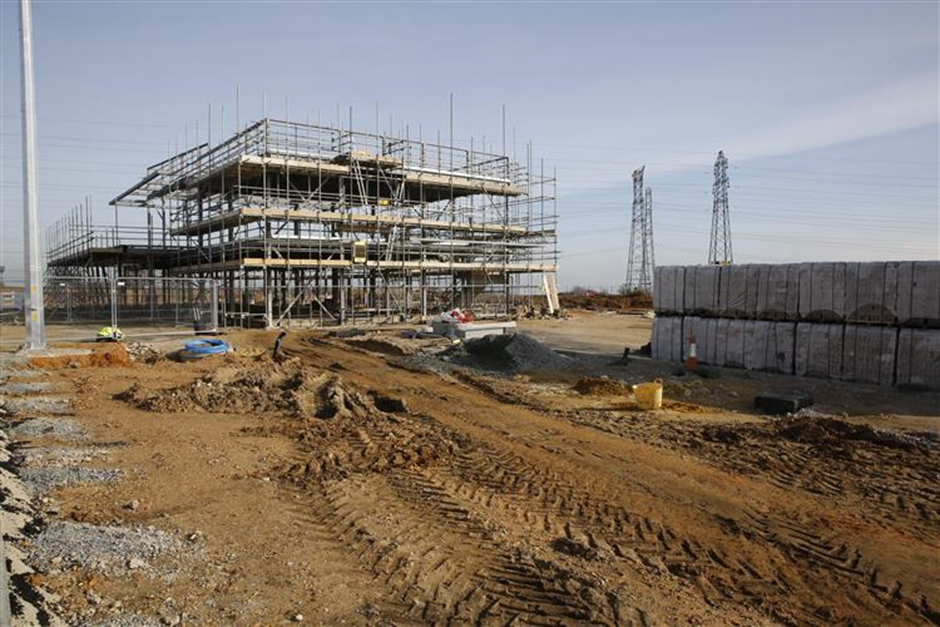With a reputation for delivering cutting-edge solutions across various engineering disciplines, TGA’s team boasts a wealth of knowledge and expertise. Now, our “In the Spotlight” blog series brings their stories to you, shedding light on the people who make TGA Consulting Engineers the industry leader it is today.
In this exclusive series, we dive deep into the lives and experiences of TGA’s talented engineers. We uncover their journeys, passions, and the innovative projects they’re currently working on. With each interview, you’ll gain a unique perspective into the world of engineering and the people driving change within the industry.
Introducing…
Russell Entwistle, TGA’s Leeds Office Lead and Technical Director.
Russell joined TGA in 2022 as a Technical Director and lead for the Leeds office. He has vast experience in the delivery of building services, energy strategies and low carbon master planning across a wide range of sectors.
His passion is to drive down the energy and carbon production of buildings, incorporating sustainable and low carbon technologies whilst providing environmental solutions that are low-tech, simple to operate and that provide good thermal comfort and conditions to live, work and play.
He has over 20 years of experience in consultancy engineering and became a Chartered Engineer in 2010. Over the course of his career Russell has worked across a wide range of sectors including defence, healthcare, higher education, secondary education, leisure, retail, commercial and energy masterplanning.
Let’s find out a bit more about him….
What’s your name/job title/role/office?
Russell Entwistle, Technical Director – Office Lead, Leeds
Current projects you’re working on?
Within the office we are working across a diverse range of sectors at project stages varying from concept through to installation on site, each with their own set of requirements and challenges.
The list of current projects is extensive but to name a few; a new educational facility in Leeds, Hull Maritime Museum and St Williams College in York.
Most exciting part of your job?
The early concept design stage of a project always feels like the most creative part, however, solving a problem during installation on site with the least amount of impact will challenge your creativity further and will develop you as an engineer.
Do you have any people who inspire(d) you/your work?
Christine Lowry and David Beck were inspirational mentors during my early career. Both have great technical knowledge alongside the ability to easily convey their ideas to those who don’t perhaps have the same level of interest in engineering.
With regards to influencing my work ethic, this is down to both of my parents. For those days when you need an early start but can’t find the energy, I think of my dad working shifts. I get out of bed pretty sharpish at that point!
Number 1 tip/piece of advice for aspiring engineers?
Ask questions, don’t struggle with something you don’t understand. You’ll find that most engineers are friendly and enjoy passing on their knowledge and wisdom.
What has been your career path so far?
This will be my 20th year in the industry, starting as a graduate engineer in 2004. Key milestones include:
Masters in Architecture and Environmental Design (MEng) – 2000-2004
First job in building services – 2004
Co-founded the CIBSE Yorkshire Young Engineers Network – 2007
Chartered Engineer and Member of CIBSE – 2010
Low Carbon Consultant – 2020
Joined TGA – 2022
How have your engineering skills developed over your career?
You need to specialise in your core discipline, however, to work collaboratively with the project team you also need to have an appreciation and understanding of other’s requirements. How does your design impact on the building fabric? What information does the civil engineer require from you and when? All of this is learnt with experience and the key to success is communication – continually engaging with the wider team is a must.
Why did you pursue a career in engineering/anything specific that solidified you wanting to go for it?
I’ve always had an interest in problem solving, creativity and maths which is an ideal mix for a career in engineering. At the start of my degree my intention was to become an architect with an understanding of engineering, but that changed during the course with my interest moving towards building services engineering.
Where do you see things going in the future/future aspirations?
The aspiration is the continued growth and development of the Leeds office. Over the past two years we have built a strong core team from which we can support new starters and continue our expansion.
We are working on a number of interesting projects within the Yorkshire region across a range of various sectors, continuing to support our existing clients and seek new opportunities.
Why did you join this company?
When meeting Jason and Scott for the first time in my interview, they gave me a great insight into the practice and what the future growth plans were. The opportunity to join a company of TGA’s reputation and to grow their Leeds office was exciting and a journey I very much wanted to be part of.
What area of engineering are you most interested in, and why?
Taking an idea from concept and building it into a detailed solution. We have undertaken a number of decarbonisation projects and the process of interrogation, analysis, understanding and designing an approach to make the buildings more sustainable is always challenging, but very rewarding.
How do you keep up with the latest changes to engineering codes and regulations?
CIBSE, industry publications, networking, speaking to manufacturers and exchanging knowledge within TGA.
How often do you update training/how do you to ensure you are informed on the latest engineering developments/latest software programs?
This is an ever-changing industry with amendments to regulations, technologies and software packages. Training and development has to be continuous, whether that is looking to improve efficiencies in design development or your skill set to best serve your clients.
How do you handle a last-minute shift in goals when much of the work is already completed?
Take a deep breath… then liaise with the project team to understand the situation. The change will be requested for a reason and once you comprehend the why, you’ll be better placed to know how to manage and resolve the matter.



